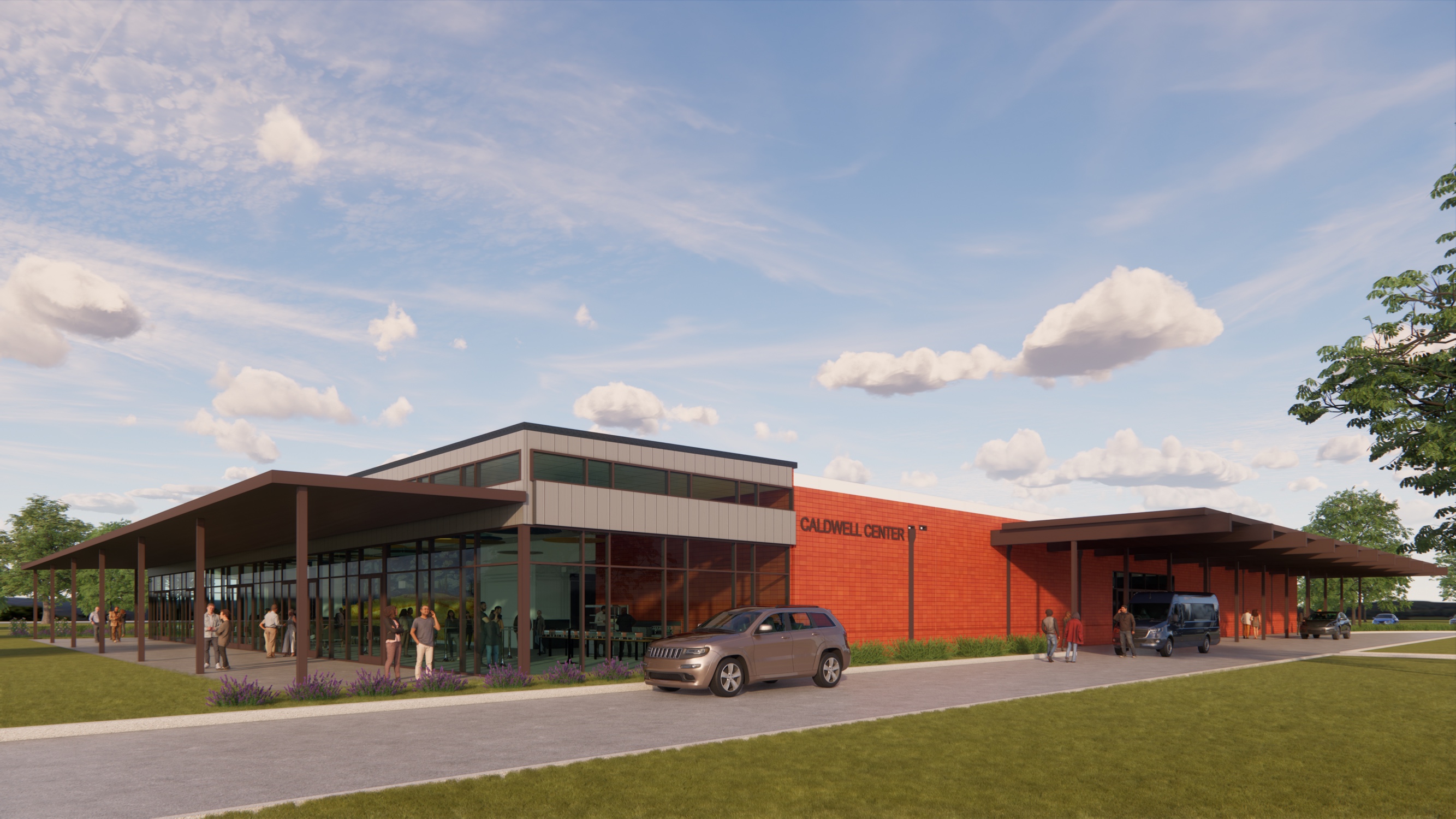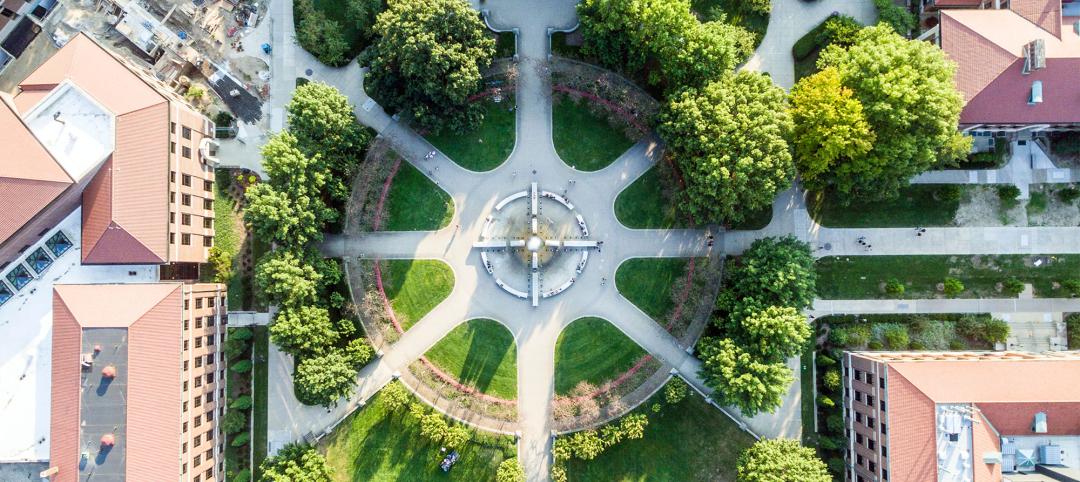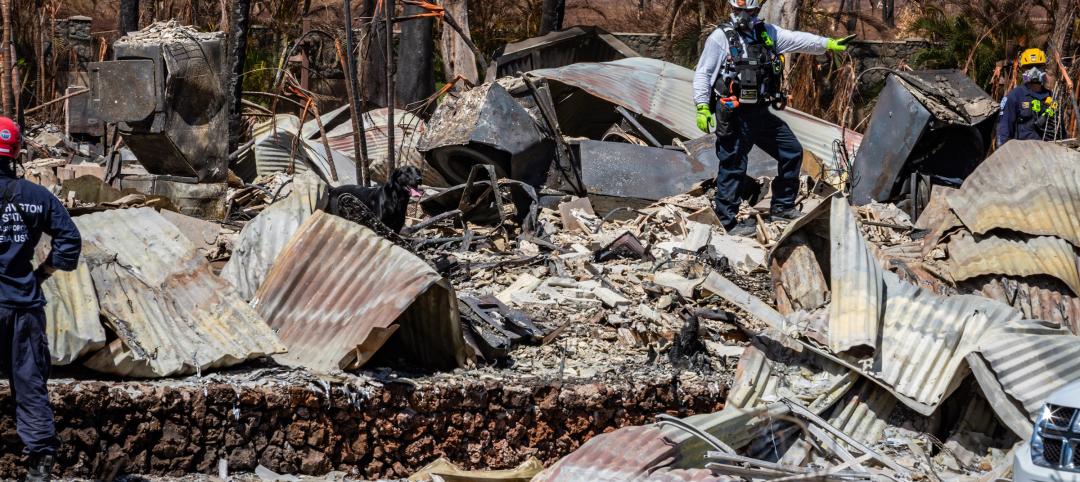A new 45,000 sf FEMA-operated evacuation shelter in the Greater Austin metropolitan area will begin construction this fall. The center will be available to house people in the event of a disaster such as a major hurricane and double as an events venue when not needed for emergency shelter.
The Caldwell County Evacuation Center will house up to 350 people comfortably within its main hall. Supply trucks can deliver necessities to the back of building which includes designated office space to accommodate FEMA operations and a warming kitchen where food will be served. Overlooking the sweeping natural landscape, an elevated outdoor patio and adjacent interior concourse will function as a breakout space for events and a provide outdoor connectivity for evacuees.
Warm tones and wood accents will be incorporated throughout to combat the stale environment often seen in evacuation shelters. Elevated fixtures and details will be included in the restrooms such as floor-to-ceiling partitions between each stall and individual shower rooms for an increased sense of privacy and space. Families seeking shelter with young children will also have three designated mothers’ rooms to choose from for nursing and pumping, as well as extra changing tables in both the women’s and men’s restrooms.
Extra charging outlets will be deployed in the corridors and common spaces to help decrease congestion in the main hall and encourage evacuees to explore alternative spaces with natural light and outdoor views. Acoustic measures in the ceiling and wall panels will be integrated to help mitigate noise throughout the building, not only for functional purposes but also to reduce overstimulation when the building is at capacity.
The facility is likely to host residents of coastal areas of the state during hurricane emergencies. Damaging hurricanes have become more common in Texas, with eight of the 10 most active years occurring since the mid-1990s. These storms have impacted thousands of coastal area residents. Hurricane Harvey, for example, displaced approximately 32,000 people in shelters across the state. Inland areas such as the Austin metroplex can provide temporary shelter for these residents.
Owner and/or developer: County of Caldwell
Design architect: Method Architecture
Architect of Record: Method Architecture
MEP Engineer: IMEG
Civil Engineer: Doucet, a Kleinfelder Company
Structural Engineer: IMEG
Landscape Architect: Coleman & Associates
Grant Administrator: Langford Community Management Services
General Contractor: N/A
Related Stories
Building Materials | Oct 2, 2023
Purdue engineers develop intelligent architected materials
Purdue University civil engineers have developed innovative materials that can dissipate energy caused by various physical stresses without sustaining permanent damage.
Resiliency | Sep 25, 2023
National Institute of Building Sciences, Fannie Mae release roadmap for resilience
The National Institute of Building Sciences and Fannie Mae have released the Resilience Incentivization Roadmap 2.0. The document is intended to guide mitigation investment to prepare for and respond to natural disasters.
Codes and Standards | Sep 25, 2023
Modern codes, construction techniques saved structures in Maui wildfire
Modern building codes and construction techniques were effective in saving buildings from the devastating wildfire in Maui on August 9th, according to a recent report, IBHS Early Insights Lahaina Fire—2023, from the Insurance Institute for Business and Home Safety’s research division.
Mass Timber | Sep 19, 2023
Five Things Construction Specialties Learned from Shaking a 10-Story Building
Construction Specialties (CS) is the only manufacturer in the market that can claim its modular stair system can withstand 100 earthquakes. Thanks to extensive practical testing conducted this spring at the University of California San Diego (UCSD) on the tallest building ever to be seismically tested, CS has identified five significant insights that will impact all future research and development in stair solutions.
Engineers | Sep 15, 2023
NIST investigation of Champlain Towers South collapse indicates no sinkhole
Investigators from the National Institute of Standards and Technology (NIST) say they have found no evidence of underground voids on the site of the Champlain Towers South collapse, according to a new NIST report. The team of investigators have studied the site’s subsurface conditions to determine if sinkholes or excessive settling of the pile foundations might have caused the collapse.
Resiliency | Sep 11, 2023
FEMA names first communities for targeted assistance on hazards resilience
FEMA recently unveiled the initial designation of 483 census tracts that will be eligible for increased federal support to boost resilience to natural hazards and extreme weather. The action was the result of bipartisan legislation, the Community Disaster Resilience Zones Act of 2022. The law aims to help localities most at risk from the impacts of climate change to build resilience to natural hazards.
Metals | Sep 11, 2023
Best practices guide for air leakage testing for metal building systems released
The Metal Building Manufacturers Association (MBMA) released a new guidebook, Metal Building Systems - Best Practices to Comply with Whole-Building Air Leakage Testing Requirements.
Codes and Standards | Aug 31, 2023
Community-led effort aims to prevent flooding in Chicago metro region
RainReady Calumet Corridor project favors solutions that use natural and low-impact projects such as rain gardens, bioswales, natural detention basins, green alleys, and permeable pavers, to reduce the risk of damaging floods.
Sustainability | Aug 15, 2023
Carbon management platform offers free carbon emissions assessment for NYC buildings
nZero, developer of a real-time carbon accounting and management platform, is offering free carbon emissions assessments for buildings in New York City. The offer is intended to help building owners prepare for the city’s upcoming Local Law 97 reporting requirements and compliance. This law will soon assess monetary fines for buildings with emissions that are in non-compliance.
Resiliency | Aug 7, 2023
Creative ways cities are seeking to beat urban heat gain
As temperatures in many areas hit record highs this summer, cities around the world are turning to creative solutions to cope with the heat. Here are several creative ways cities are seeking to beat urban heat gain.
















